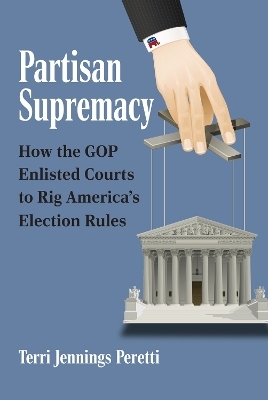
Partisan Supremacy
How the GOP Enlisted Courts to Rig America's Election Rules
Seiten
2020
University Press of Kansas (Verlag)
978-0-7006-3019-6 (ISBN)
University Press of Kansas (Verlag)
978-0-7006-3019-6 (ISBN)
- Lieferbar (Termin unbekannt)
- Versandkostenfrei innerhalb Deutschlands
- Auch auf Rechnung
- Verfügbarkeit in der Filiale vor Ort prüfen
- Artikel merken
Explores four contemporary election law issues - voter identification, gerrymandering, campaign finance, and the preclearance regime of the Voting Rights Act - to uncover whether Republican politicians and Republican judges have collaborated to tilt America's election rules in the GOP's favour.
I have no agenda,' US Supreme Court Chief Justice John Roberts proclaimed at his Senate confirmation hearing: 'My job is to call balls and strikes and not to pitch or bat.' This declaration was in keeping with the avowed independence of the judiciary. It also, when viewed through the lens of Roberts's election law decisions, appears to be false. With a scrupulous reading of judicial decisions and a careful assessment of partisan causes and consequences, Terri Jennings Peretti tells the story of the GOP's largely successful campaign to enlist judicial aid for its self-interested election reform agenda.
Partisan Supremacy explores four contemporary election law issues - voter identification, gerrymandering, campaign finance, and the preclearance regime of the Voting Rights Act - to uncover whether Republican politicians and Republican judges have collaborated to tilt America's election rules in the GOP's favor. Considering cases from Shelby County v. Holder, which enfeebled the Voting Rights Act, to Crawford v. Marion County Election Board, which upheld restrictive voter identification laws, to Citizens United and McCutcheon, which loosened campaign finance restrictions, Peretti lays bare the reality of 'friendly' judicial review and partisan supremacy when it comes to election law. She nonetheless finds a mixed verdict in the redistricting area that reveals the limits of partisan control over judicial decisions. Peretti's book helpfully places the current GOP's voter suppression campaign in historical context by acknowledging similar efforts by the postCivil War Democratic Party. While the modern Democratic Party seeks electoral advantage by expanding voting by America's minorities and youth, arguably hewing closer to democratic principles, neither party is immune to the powerful incentive to bend election rules in its favor.
In view of the evidence that Partisan Supremacy brings to light, we are left with a critical and pressing question: Can democracy survive in the face of partisan collaboration across the branches of government on critical election issues?
I have no agenda,' US Supreme Court Chief Justice John Roberts proclaimed at his Senate confirmation hearing: 'My job is to call balls and strikes and not to pitch or bat.' This declaration was in keeping with the avowed independence of the judiciary. It also, when viewed through the lens of Roberts's election law decisions, appears to be false. With a scrupulous reading of judicial decisions and a careful assessment of partisan causes and consequences, Terri Jennings Peretti tells the story of the GOP's largely successful campaign to enlist judicial aid for its self-interested election reform agenda.
Partisan Supremacy explores four contemporary election law issues - voter identification, gerrymandering, campaign finance, and the preclearance regime of the Voting Rights Act - to uncover whether Republican politicians and Republican judges have collaborated to tilt America's election rules in the GOP's favor. Considering cases from Shelby County v. Holder, which enfeebled the Voting Rights Act, to Crawford v. Marion County Election Board, which upheld restrictive voter identification laws, to Citizens United and McCutcheon, which loosened campaign finance restrictions, Peretti lays bare the reality of 'friendly' judicial review and partisan supremacy when it comes to election law. She nonetheless finds a mixed verdict in the redistricting area that reveals the limits of partisan control over judicial decisions. Peretti's book helpfully places the current GOP's voter suppression campaign in historical context by acknowledging similar efforts by the postCivil War Democratic Party. While the modern Democratic Party seeks electoral advantage by expanding voting by America's minorities and youth, arguably hewing closer to democratic principles, neither party is immune to the powerful incentive to bend election rules in its favor.
In view of the evidence that Partisan Supremacy brings to light, we are left with a critical and pressing question: Can democracy survive in the face of partisan collaboration across the branches of government on critical election issues?
Terri Jennings Peretti is a professor in the Department of Political Science at Santa Clara University.
| Erscheinungsdatum | 15.01.2021 |
|---|---|
| Verlagsort | Kansas |
| Sprache | englisch |
| Maße | 162 x 233 mm |
| Gewicht | 695 g |
| Themenwelt | Sachbuch/Ratgeber ► Geschichte / Politik ► Allgemeines / Lexika |
| Geisteswissenschaften ► Geschichte ► Allgemeine Geschichte | |
| Geisteswissenschaften ► Geschichte ► Regional- / Ländergeschichte | |
| Sozialwissenschaften ► Politik / Verwaltung ► Politische Systeme | |
| Sozialwissenschaften ► Politik / Verwaltung ► Politische Theorie | |
| Sozialwissenschaften ► Politik / Verwaltung ► Staat / Verwaltung | |
| ISBN-10 | 0-7006-3019-8 / 0700630198 |
| ISBN-13 | 978-0-7006-3019-6 / 9780700630196 |
| Zustand | Neuware |
| Informationen gemäß Produktsicherheitsverordnung (GPSR) | |
| Haben Sie eine Frage zum Produkt? |
Mehr entdecken
aus dem Bereich
aus dem Bereich
von der Antike bis ins 21. Jahrhundert
Buch | Softcover (2024)
C.H.Beck (Verlag)
12,00 €


